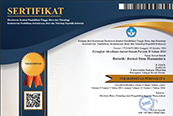Human’s and Nonhuman’s Negotiations after the Conversion of the Function of Mangrove Forests into Salt Mine
(1) Sanata Dharma University
(*) Corresponding Author
Abstract
This research aims to look at the relationship between humans and nonhumans after the conversion of mangrove forests to salt mines in Weseben village, especially in Metamanasi village, East Nusa Tenggara. More than that, this research looks at negotiation efforts between nonhumans in building sustainable life from a posthuman perspective. The starting point for these negotiations was the destruction of mangrove forests which had been converted into salt mines. The existence of mangrove forests in fact has a very important role for humans and nonhumans in the Metamanasi area. Apart from that, the Metamanasi community is close to mangrove forests. They are able to recognize scent, shape, color and even bioacoustics. However, this closeness faded when the mangrove forests were exploited to build salt mines. The conversion of mangrove forests into salt mines has brought about huge changes in relations between humans and nonhumans in the Metamanasi area. So, the question asked in this research is how to restore relations between humans and nonhumans after the conversion of mangrove forests into salt mines? Why do humans and nonhumans carry out recovery after the conversion of mangrove forests into salt mines? To answer these questions requires research methods in data collection. Data was obtained through field observations, interviews, and data documentation from online media. The data obtained was analyzed using a posthuman approach, namely the “making kin” theory from Donna Haraway and “zoe” from Rosi Braidotti. So that in the end we see the efforts of humans and non-humans in restoring their lives as relatives as well as being subjects who continue to move.
Keywords
Full Text:
PDF (Bahasa Indonesia)DOI: https://doi.org/10.24071/ret.v12i1.7501
Refbacks
- There are currently no refbacks.
Copyright (c) 2024 Eventus Ombri Kaho

This work is licensed under a Creative Commons Attribution 4.0 International License.
Retorik: Jurnal Ilmu Humaniora is published by the Graduate Program in Cultural Studies at Sanata Dharma University, Yogyakarta, Indonesia.
Retorik is also available in print edition. Please click here for contact information.










